– Support to cultivate vegetables in the Mangaten Camp 1 (Part 2) –
[Original by Takaki IMAI, President (October 25, 2018); Translated by K. Adachi/S. Altman]
This time we will introduce a discussion with the camps women about the distribution of agricultural tools and management.
Distribution of agricultural tools
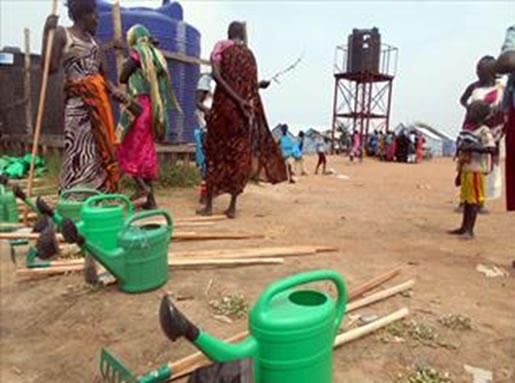
Volunteer women beautifully lined up the agricultural tools set by set to be distributed.
Well, finally it’s the distribution day. We served as volunteers for the women in the camp and lined up the agricultural tools and watering cans in sets and gave them the sets one by one. For the distribution, staff from the Relief Reconstruction Committee (RRC) of the South Sudan government attended but to our surprise, the staff helped the distribution as volunteers too.
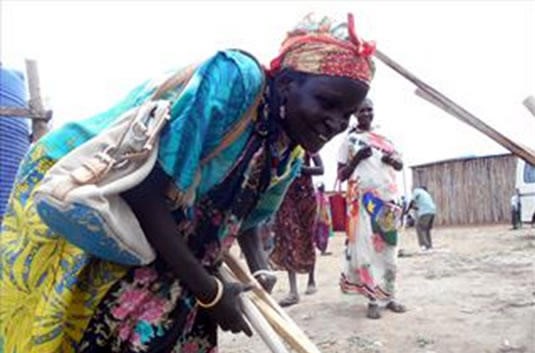
A woman receives agricultural tools. We’re looking forward what kind of crop she produces.
89 people were registered in the distribution list but, as we had anticipated, women came to the distribution site and said, “I am cultivating a home vegetable garden, but my name is not on the list” or “I want to start from now on”. After confirmation from the women who serve as caretakers, we carried out the distribution for those women and all 100 sets that we prepared were distributed.
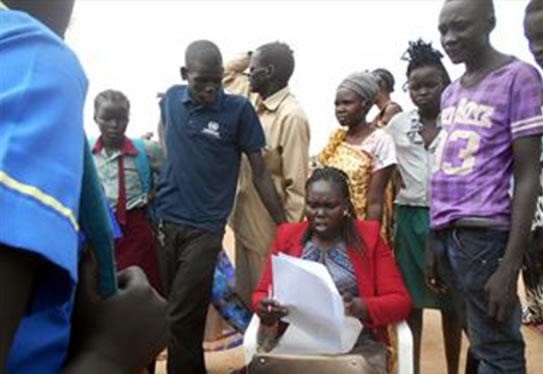
JVC staff taking role call during the distribution reception.
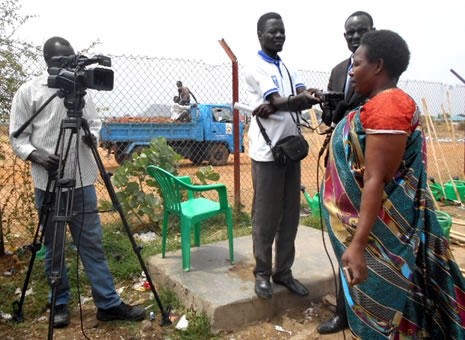
Ms. Mary, the female leader, being interviewed.
At the same time, we gave 10 wheelbarrows to be used communally. The distribution finished in about 1 hour without problems.
SSBC, the national TV of South Sudan, shot video of the distribution and broadcasted an interview with me and the female leader, Ms. Mary, on television.
Troubles with wheelbarrows
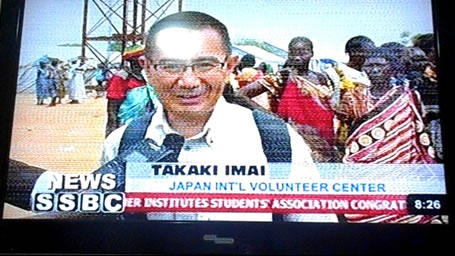
The interview was broadcasted on the evening news 2 days later.
After the distribution finished, Peter, the camp leader, discussed with the women about the management of the wheelbarrows. He proposed that,
“We will store the 10 wheelbarrows altogether in a warehouse placed in the camp. The camp leader will appoint the manager of the wheelbarrows, who lends them to people when necessary. How about this idea?”
But all the women including Ms. Mary disagreed.
“Storing them altogether isn’t acceptable. The men managing the wheelbarrows also isn’t acceptable. That would be the same as the last time.”
It appeared there was some reason that everyone disagreed. “Was there an incident before?”
“Before, the men took out all the wheelbarrows and agricultural tools and sold them somewhere. We clearly remember it.”
According to Ms. Mary, an aid organization supported agricultural tools and wheelbarrows before. At that time, although they stored the tools and wheelbarrows in a warehouse, the men took them out of the camp and sold them without the knowledge of the women. I understood the reason why the women said, “If it’s not one unit for one person, we don’t need it” when we talked about the support for wheelbarrows the first time.
The women aggressively insisted against the plan during the discussion and Peter was outnumbered. Finally, it was concluded that the women would decide the management method through their own discussion, not by “storing the wheelbarrows altogether in a warehouse”.
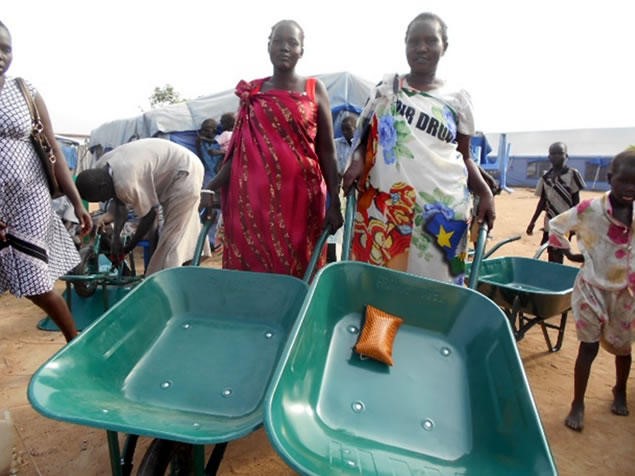
Wheelbarrows under the management of a women’s group.
After a while, we visited the camp and asked, “Where do you store the wheelbarrows”, and Ms. Mary took us to a tent. Two wheelbarrows were stored inside the tent.
“The camp is divided in five residential areas and each area has one female leader. Each leader stores two wheelbarrows in their own tent. Women in each residential area come to the leader’s place to borrow a wheelbarrow when they want to use it.”
As a result of the discussion, they decided to adopt this management method.
The distribution of agricultural tools, irrigation tools, and wheelbarrows was completed in this way. After discussions with the women’s groups, we also supported five kinds of seeds (peanut, black-eyed pea bean, eggplant, okura, and jew’s mallow). In April, it started raining and sowing was carried out. We will report the status of the sowing and the growth of the crops next time.
Share This: